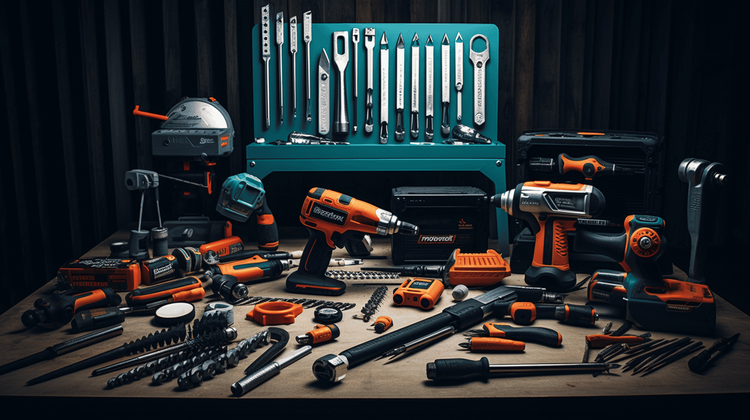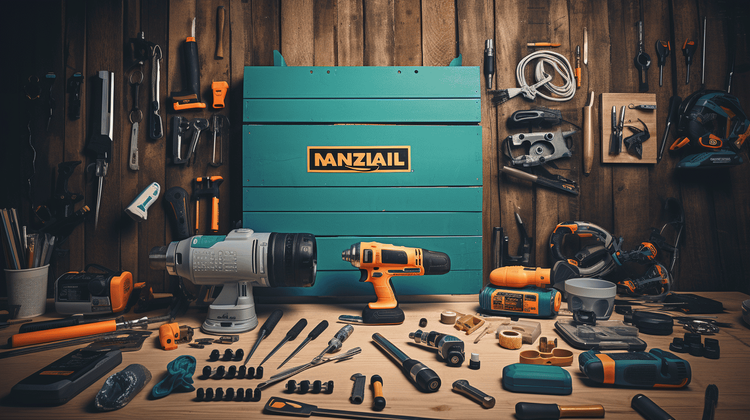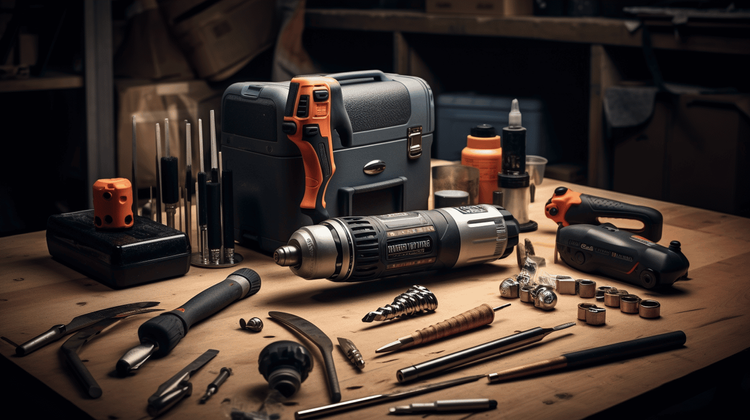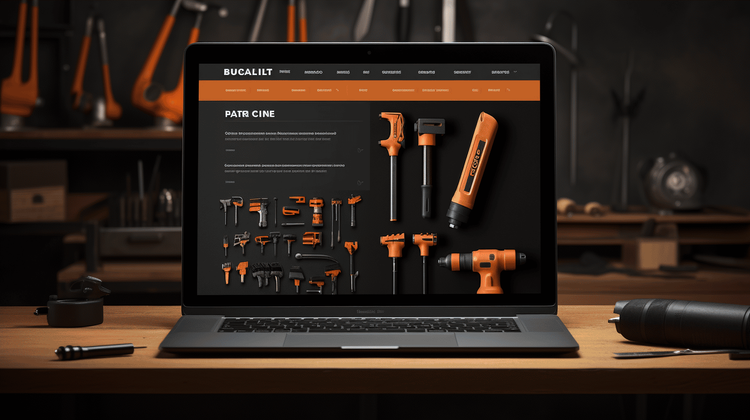DIY Hacks: Money-Saving Tips for Finding Cheap Tools and Equipment

Hey there DIY enthusiasts! Are you tired of breaking the bank every time you need to buy tools and equipment for your projects? Well, you're in luck! In this article, we're going to share some awesome money-saving tips on how to find cheap tools and equipment. So, get ready to unleash your creativity without emptying your wallet.
We all know that tools and equipment can be quite expensive, especially if you're starting from scratch or working on a tight budget. But that doesn't mean you have to give up on your dreams of becoming a DIY master. With a little bit of resourcefulness and some smart shopping techniques, you can find affordable tools and equipment that will help you bring your projects to life.
So, whether you're a seasoned DIY-er or just starting out, this article is for you. We're going to explore various avenues for finding tools and equipment at wallet-friendly prices. From online marketplaces to garage sales, thrift stores to DIY workshops, we've got you covered. So, let's dive in and discover the world of DIY hacks for saving money on tools and equipment!
Evaluate Your Needs
When it comes to embarking on DIY projects, having the right tools and equipment is essential. However, buying brand new items can quickly add up and become expensive. Luckily, there are various ways to find cheap tools and equipment that won't break the bank. In this section, we will explore some money-saving tips to help you evaluate your needs and prioritize your DIY projects.
Assessing the Tools and Equipment Required
Before you start hunting for cheap tools and equipment, it's crucial to assess what you actually need for your DIY projects. Here are a few things to consider:
- Project requirements: Take a moment to think about the specific tools and equipment that each project requires. This will help you avoid purchasing unnecessary items and focus on what you truly need.
- Quality vs. cost: While it's tempting to go for the cheapest option available, it's important to strike a balance between quality and cost. You want tools that will last and perform well, even if they are second-hand or discounted.
- Versatility: Look for tools and equipment that can serve multiple purposes. This way, you can maximize their use and save money in the long run.
Prioritizing Your DIY Projects
Once you've assessed the tools and equipment required for your DIY projects, it's time to prioritize them. Remember, you don't have to tackle every project at once. Prioritizing allows you to focus on the most important and urgent projects first. Here are a few tips to help you prioritize:
- Safety and functionality: Start by prioritizing projects that relate to safety and functionality. These may include fixing broken fixtures, repairing leaky pipes, or addressing electrical issues.
- Seasonal projects: Consider the time of year and prioritize projects that are seasonally appropriate. For example, if winter is approaching, focus on projects like weatherizing your home or insulating windows.
- Budget and timeline: Take into account your budget and timeline for each project. Prioritize projects that align with your financial capabilities and the time you have available.
By evaluating your needs and prioritizing your DIY projects, you can focus on finding the tools and equipment that will be most useful to you. This will help you save money and avoid purchasing items that will sit unused in your toolbox. So, let's move on to the next step and discover how to research online marketplaces for cheap tools and equipment.
Research Online Marketplaces
In today's digital age, finding affordable tools and equipment for your DIY projects has never been easier. Online marketplaces have become a go-to resource for individuals looking to save money while still getting quality tools. Whether you're a seasoned DIY enthusiast or just starting out, here are some tips for researching online marketplaces and finding the best deals:
Popular Online Marketplaces for Used Tools
When it comes to finding used tools at discounted prices, online marketplaces are the way to go. These platforms connect buyers and sellers from all around the world, making it easy to find the exact tools you need at a fraction of the cost. Here are a few popular online marketplaces to consider:
- eBay: One of the most well-known online marketplaces, eBay offers a wide range of used tools from individual sellers. You can browse through various categories, read reviews, and compare prices to find the best deals.
- Craigslist: Craigslist is a classified advertisements website where you can find local sellers offering used tools. It's a great platform to find deals in your area and arrange a convenient pickup.
- Facebook Marketplace: With the popularity of Facebook, the marketplace feature has gained traction over the years. You can easily search for used tools in your local area, message sellers directly, and negotiate prices.
Searching for Deals and Discounts
Finding cheap tools and equipment on online marketplaces requires a bit of research and patience. Here are some tips to help you find the best deals:
- Set alerts: Most online marketplaces allow you to set alerts for specific search terms. By setting alerts for the tools you need, you'll be notified whenever a new listing matches your criteria.
- Filter by price: Use the filters provided by online marketplaces to narrow down your search based on price. You can set a maximum budget to ensure you only see listings within your price range.
- Check for bundled deals: Some sellers offer bundled deals where you can get multiple tools or equipment for a discounted price. Keep an eye out for these types of listings to maximize your savings.
- Negotiate: Don't be afraid to negotiate with sellers. Many sellers are willing to negotiate the price, especially if the tool has been listed for a while. Polite and respectful communication can go a long way in securing a better deal.
Pro tip: Before making a purchase, read the product description carefully, check for any defects or damages, and ask the seller for additional information or photos if needed. It's important to ensure you're getting a quality tool that will serve your needs.
By exploring online marketplaces and utilizing the tips mentioned above, you can find affordable tools and equipment for your DIY projects without breaking the bank. Happy hunting!
Check Local Garage Sales and Flea Markets
When it comes to finding cheap tools and equipment for your DIY projects, one of the best places to look is your local garage sales and flea markets. These are treasure troves for bargain seekers and can often yield great finds at affordable prices. Not only will you be able to save money, but you may also stumble upon unique and vintage items that add character to your toolbox.
Exploring Weekend Garage Sales
Garage sales are a fantastic opportunity to find tools and equipment at discounted prices. Many people use these sales to declutter their homes, which means you can often find items in good condition that they no longer need. Here are some tips for finding great deals at garage sales:
- Plan ahead: Check local classifieds or online listings to find out about upcoming garage sales in your area. Make a list of the items you're looking for and prioritize the sales you want to visit.
- Arrive early: The early bird gets the worm, and this holds true for garage sales as well. By arriving early, you have a better chance of finding the tools and equipment you need before others snatch them up.
- Negotiate: Don't be afraid to haggle. Most sellers are willing to negotiate the price, especially if you're buying multiple items or making a reasonable offer. Just be respectful and have a budget in mind.
Discovering Hidden Gems at Flea Markets
Flea markets are another great option for finding cheap tools and equipment. These markets bring together a variety of vendors selling a wide range of items, including second-hand tools and equipment. Here's how you can make the most of your flea market experience:
- Browse the stalls: Take your time to browse through the different stalls and booths at the flea market. Keep an open mind and be prepared to dig through piles of items to find the hidden gems.
- Ask the vendors: If you're looking for something specific, don't hesitate to ask the vendors if they have it or if they can point you in the right direction. They may have items tucked away that they haven't displayed yet.
- Inspect before buying: Before purchasing any tools or equipment, make sure to thoroughly inspect them for any signs of damage or wear. Test any moving parts or electrical components, if applicable, to ensure they are in working condition.
Bonus Tip: Haggle and Bundle
When shopping at garage sales and flea markets, remember that haggling is part of the experience. Don't be afraid to negotiate the price, especially if you're buying multiple items. You can often score better deals by bundling items together or asking for a discount if you're purchasing a larger quantity.
"One man's trash is another man's treasure." This saying couldn't be truer when it comes to garage sales and flea markets. With a little bit of patience and some savvy bargaining skills, you can find amazing deals on tools and equipment that will help you with all your DIY projects. So next weekend, grab your shopping bag and head out to explore the local garage sales and flea markets – you never know what hidden gems you may find!
Visit Thrift Stores and Second-Hand Shops
Are you a fan of thrift shopping? Well, you're in luck! Thrift stores and second-hand shops can be a goldmine when it comes to finding cheap tools and equipment for your DIY projects. These stores often have a wide variety of items that have been gently used or donated, making them a treasure trove for savvy shoppers. Here are some tips on how to make the most of your thrift store visits:
Finding Bargains at Thrift Stores
Thrift stores are known for selling a range of second-hand goods at affordable prices, and tools are no exception. Here's how you can find great deals on tools and equipment at thrift stores:
- Keep an Open Mind: Thrift stores have a constantly changing inventory, so it's essential to have an open mind when browsing. You never know what hidden gem you might find!
- Check Regularly: Make it a habit to visit your local thrift store regularly. New items are constantly being added, and you don't want to miss out on any great finds.
- Inspect the Quality: Before making a purchase, take the time to inspect the quality and condition of the tools you're interested in. Look for signs of wear and tear or any damage that might affect their usability.
- Ask About Discounts: Some thrift stores offer discounts on certain days or for specific items. Don't hesitate to ask about any ongoing promotions or sales. You might just score an even better deal!
Supporting Local Second-Hand Shops
Apart from thrift stores, there are also dedicated second-hand shops that specialize in tools and equipment. These local shops often have a more curated selection and may carry higher-quality items. Here's why you should consider supporting these second-hand shops:
- Expertise and Advice: The staff at local second-hand shops are often knowledgeable about tools and can provide you with helpful advice on your DIY projects. They may even be able to guide you towards the best tools for your specific needs.
- Quality Assurance: While thrift stores have a mix of items, second-hand shops typically focus on selling high-quality tools. This means you can have more confidence in the durability and performance of the items you purchase.
- Community Impact: When you choose to buy from local second-hand shops, you're directly supporting small businesses in your community. By contributing to their success, you help create a vibrant local economy.
Remember, while thrift stores and second-hand shops can be great sources for finding cheap tools and equipment, it's important to prioritize safety. Always ensure that the tools you purchase are in good working condition and meet the necessary safety standards.
Renting Tools and Equipment
Sometimes there may be a DIY project that requires a specialized tool or piece of equipment that you don't already own. Rather than purchasing it outright, renting can be a cost-effective solution. Renting tools and equipment allows you to access high-quality tools for a fraction of the cost of buying them.
Considering Short-Term Rentals
Renting tools and equipment is advantageous for short-term projects or one-time use. Here are a few reasons why you should consider renting:
- Cost-effective: Renting tools and equipment is usually much cheaper than buying them outright, especially if you only need them for a short period of time. It saves you from investing a significant amount of money in something you may not use often.
- Access to specialized tools: Some DIY projects may require specific tools or equipment that you won't need again in the future. Instead of purchasing them, renting allows you to access these specialized tools without the long-term commitment.
- No maintenance or storage: By renting, you don't have to worry about the maintenance and storage of the tools. Rental companies typically take care of regular maintenance and keep the equipment in good working condition.
- Try before you buy: Renting is a great way to try out different brands and models of tools and equipment before deciding to make a purchase. It allows you to get a feel for the tool and determine if it meets your needs and preferences.
Utilizing Tool Libraries
In addition to traditional tool rental companies, another option to consider is utilizing tool libraries. Tool libraries are community-based organizations that allow individuals to borrow tools and equipment for a small fee or donation. Here's why you should explore this option:
- Cost savings: Tool libraries often have a wide range of tools available for borrowing at a fraction of the cost compared to renting from a commercial rental company. This can result in significant cost savings, especially for DIY enthusiasts on a tight budget.
- Community support: By using tool libraries, you are supporting a valuable community resource. These organizations often provide access to tools and equipment for individuals who may not have the financial means to purchase or rent them.
- Build connections: Tool libraries are great places to meet fellow DIY enthusiasts and build connections within your community. You can exchange tips and advice, share project ideas, and even collaborate on projects together.
- Expanded tool options: Tool libraries often have a wide range of tools beyond the basics. They may have specialized or unique tools that are not commonly found in rental companies. This gives you the opportunity to experiment with different tools and broaden your DIY skillset.
Renting tools and equipment is a practical and affordable option for DIY projects. It allows you to have access to the tools you need without the burden of storing and maintaining them long-term. Consider short-term rentals for specific projects and explore tool libraries for a budget-friendly and community-focused approach to borrowing tools. Happy DIY-ing!
Borrowing from Friends and Neighbors
When it comes to DIY projects, one of the best ways to save money on tools and equipment is by borrowing them from friends and neighbors. Not only does this help you avoid the cost of buying new tools, but it also allows you to build a network of like-minded individuals who share your passion for DIY.
Building a Network of DIY Enthusiasts
One of the great benefits of borrowing tools from friends and neighbors is the opportunity to connect with other DIY enthusiasts. By reaching out to your friends, family members, and neighbors, you can find out who has what tools and equipment that you need. This not only creates a sense of community but also gives you the chance to learn from others who have experience in different areas of DIY.
Creating Borrowing Agreements
To ensure a smooth borrowing experience, it's important to establish clear borrowing agreements with the individuals you're borrowing from. Here are a few tips to keep in mind:
- Communicate: Clearly communicate your needs and expectations with the person you're borrowing from. Discuss the duration of the borrowing period, any specific conditions or precautions for using the tools, and how they should be returned. Open communication will help avoid any misunderstandings or conflicts down the line.
- Respect their tools: Treat borrowed tools as if they were your own. Take proper care of them, follow any usage instructions provided, and return them in the same condition you received them. This will go a long way in maintaining good relationships with your friends and neighbors.
- Offer something in return: While borrowing tools, it's always a good idea to offer something in return. This could be lending your own tools when they need them or offering your skills and assistance in their own DIY projects. This reciprocity strengthens your relationships and makes future borrowing arrangements more likely.
By following these tips, you can ensure a positive borrowing experience and foster a community of DIY enthusiasts who support and help each other.
Remember, borrowing tools and equipment from friends and neighbors is not only a cost-effective option, but it also allows you to build connections within your community. So don't hesitate to reach out to your DIY-loving friends and start borrowing those tools!
Attend Local DIY Workshops and Events
One of the best ways to learn new DIY skills and get your hands on affordable tools and equipment is by attending local DIY workshops and events. These events are not only educational but can also provide you with opportunities to network with like-minded individuals and discover great deals on tools and equipment. Here's why you should consider attending these workshops and events:
Hands-On Learning and Tool Discounts
One of the biggest benefits of attending DIY workshops and events is the opportunity to learn new skills through hands-on experiences. These workshops are usually conducted by experts in the field who will guide you through various DIY projects and teach you the techniques required to complete them successfully.
Additionally, many of these workshops offer special discounts on tools and equipment. Some even partner with local hardware stores to offer exclusive deals for workshop participants. So not only will you gain new knowledge, but you may also be able to purchase tools and equipment at discounted prices, saving you even more money in the long run.
Networking with Like-Minded Individuals
Attending DIY workshops and events allows you to connect with other people who share your passion for DIY projects. It's a great opportunity to meet fellow enthusiasts, exchange ideas, and even form friendships. By connecting with others who have similar interests, you may learn about additional resources, tools, or techniques that you weren't aware of before.
Networking can also lead to collaborative projects in the future. You might find someone who has a particular tool or equipment that you need for a specific project but don't want to purchase. By networking and building relationships, you can potentially borrow or share tools, further reducing your costs.
Local DIY Workshops and Events
To find local DIY workshops and events, you can use the following methods:
- Check with your local community centers, libraries, and adult education centers. They often have listings of upcoming workshops and events.
- Join DIY-related groups or organizations in your area. These groups may host their own workshops or have information on upcoming DIY events.
- Follow social media pages or websites that focus on DIY projects and events. They often share information about local workshops and events.
Remember, attending local DIY workshops and events is not just about acquiring new skills and tools; it's an opportunity to engage with a community of like-minded individuals who can provide support, inspiration, and valuable resources. Plus, you might just have a great time and make some lasting friendships along the way. So, be sure to keep an eye out for upcoming workshops and events in your area!
"Attending DIY workshops and events is a fantastic way to learn new skills, get hands-on experience, and connect with other DIY enthusiasts."
Make Your Own Tools and Equipment
If you're looking to save some extra money while pursuing your DIY projects, why not consider making your own tools and equipment? Not only can you create customized tools that suit your specific needs, but you'll also have the satisfaction of knowing that you made them with your own two hands. Here are some tips and ideas to get you started on making your own tools and equipment:
Repurposing Common Household Items
One of the most cost-effective ways to make your own tools and equipment is to repurpose common household items. Look around your home and think creatively about how you can transform everyday objects into useful tools. Here are a few examples to spark your imagination:
- Screwdriver: If you have an old butter knife lying around, you can easily convert it into a makeshift screwdriver. Simply reshape the handle to fit comfortably in your hand and grind down one end to create a flat and sturdy screwdriver tip.
- Clamps: Need a clamp but don't want to splurge on an expensive one? Use old wooden clothespins or binder clips as makeshift clamps. They might not have the same level of power as professional clamps, but they can come in handy for light-duty projects.
- Paintbrushes: Instead of buying expensive stencil brushes, try using an old toothbrush or an old, stiff-bristled paintbrush. Trim the bristles to the desired length to create a homemade stencil brush.
DIY Tool and Equipment Tutorials
If you're feeling a bit more adventurous and want to try your hand at building your own tools and equipment from scratch, there are plenty of online tutorials and resources available. Here are a few ideas to inspire you:
- Workbench: Building a sturdy workbench is essential for any DIY enthusiast. With some basic woodworking skills, you can construct your own workbench using affordable materials like plywood and lumber. Online tutorials will guide you through the step-by-step process.
- Toolbox: Rather than buying an expensive toolbox, why not build your own? It can be as simple as repurposing an old wooden crate or as complex as constructing a multi-tiered toolbox with drawers and compartments. Again, online tutorials will help you navigate the construction process.
- Woodworking Tools: If you enjoy woodworking projects, consider making your own woodworking tools. From hand planes to chisels, there are numerous tutorials available that show you how to craft these tools using basic tools like a hacksaw, file, and sandpaper.
Remember, safety should always be your top priority when making your own tools and equipment. Be sure to wear appropriate protective gear, such as gloves and safety glasses, and follow instructions carefully.
By making your own tools and equipment, you not only save money but also gain a sense of accomplishment and creativity. So, roll up your sleeves and start creating your own DIY tools today!
Conclusion
Conclusion
Finding cheap tools and equipment for your DIY projects doesn't have to be a daunting task. By following these money-saving tips, you can save big while still getting the tools and equipment you need. Remember:
- Evaluate your needs: Prioritize your DIY projects and assess the tools and equipment required to avoid unnecessary expenses.
- Research online marketplaces: Look for deals and discounts on popular online marketplaces for used tools and equipment.
- Check local garage sales and flea markets: Explore weekend garage sales and flea markets to find hidden gems at affordable prices.
- Visit thrift stores and second-hand shops: Find bargains and support local businesses by shopping at thrift stores and second-hand shops.
- Consider renting tools and equipment: Renting can be a cost-effective solution for short-term use or try utilizing tool libraries in your area.
- Borrow from friends and neighbors: Build a network of DIY enthusiasts and create borrowing agreements to share tools and equipment.
- Attend local DIY workshops and events: Benefit from hands-on learning, discounts, and networking opportunities with like-minded individuals.
- Make your own tools and equipment: Get creative by repurposing common household items or following DIY tutorials to make your own tools.
By implementing these strategies, you can save money while still having access to the tools and equipment necessary for your DIY projects. Happy DIY-ing! Ultra Handy is a company dedicated to helping individuals succeed in their life and work. Visit our eCommerce Amazon store for a wide range of products geared towards DIY enthusiasts and outdoor lovers. Our goal is to provide you with the tools and equipment you need to bring your projects to life. Check out our store and start tackling your next DIY endeavor today!
Frequently Asked Questions
- What are some ways to find cheap tools and equipment?Some ways to find cheap tools and equipment include: 1. Shopping online on websites such as eBay or Craigslist, 2. Visiting local thrift stores or pawn shops, 3. Attending garage sales or auctions, 4. Joining online communities or forums where people sell used tools, and 5. Checking for seasonal sales or discounts at home improvement stores.
- Are cheap tools and equipment of good quality?Not all cheap tools and equipment are of good quality, but it's possible to find hidden gems if you do your research. Look for reputable brands, read customer reviews, and inspect the items in person if possible to ensure they meet your quality standards.
- What should I consider when buying cheap tools and equipment?When buying cheap tools and equipment, consider factors such as the condition of the item, its functionality, warranty or return policy, compatibility with your specific needs, and the reputation of the seller. Don't compromise on safety features or essential functionalities to save money.
- Can I save money by renting tools instead of buying them?Yes, renting tools instead of buying can save you money, especially if you only need them for a short period or for a one-time project. Evaluate the cost of renting versus buying based on your specific needs and frequency of use to make an informed decision.
- Are there any DIY tool sharing or borrowing communities?Yes, there are DIY tool sharing or borrowing communities where people lend or share tools with each other. These communities can be found online through platforms like ToolBank or neighborhood-specific groups on social media. It's a great way to access tools without spending too much money.




